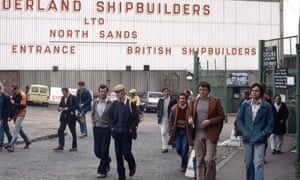Who’s to blame? There’s no need to ask for what. The problem is where to start. In history lessons at my Scottish high school, the teacher would first divide the causes of a war or other catastrophe by numbers: 1 for long term and 2 for immediate; and then subdivide those broad categories by capital letters, A and B, and so forth; and further subdivide those categories by Roman numerals, (i) and (ii) and so on; and then subdivide again by small letters, (a) and (b) etc. All of which we would copy into our jotters with our Platignum fountain pens. So that the German gunboat sent to Agadir in 1911 found its place as 1C (ix) (d) under nationalism, colonialism and Franco-German rivalry in the list of underlying reasons for the first world war.
It would be good to crystallise the causes of Brexit in a similar tabulation – to have them pinned down and ranked in order of importance so we could understand how it happened, like a soldier in the Flanders mud at last establishing the chain of events, beginning with the award of Bosnia-Herzegovina to Austria in 1878, that had led to his present awful position.
But there isn’t room for that degree of precision. In any case, it’s hard to be so precise. The reasons that follow mix the broad and the narrow.
1. Deindustrialisation The 1980s changed Britain, most of all above the line between the Wash and the Bristol Channel. Between 1979 and 1986, jobs in the manufacturing industry shrank from 7m to 5.1m. Of all the jobs lost, in services as well as manufacturing, 94% were to the north of that line. Deindustrialisation neither began nor ended in the Thatcher years, but it was under Thatcher’s premiership that shutting down factories, shipyards and mines began to seem like a perverse government ambition rather than the consequence of economic misfortune. Wealth and opportunity moved south. The social ruin was terrible. Skills were lost, traditions ended. Part of what it meant to be British disappeared. What was supposed to happen to places such as Oldham and Paisley? Nobody knew. Worse, it seemed nobody cared.
2. Immigration “Nobody asked us,” said the beleaguered inhabitants of the old industrial settlements, and it was true: nobody had. Nor had anyone explained that we, the natives, would need to think differently about where we lived and the kind of people we were – that integration, if that was the hope, needed adjustments on both sides. Nevertheless, immigration had begun to die as a political issue until, in 2004, Tony Blair’s government decided to open the UK labour market to the eight eastern and central European countries that had joined the EU. Only two other member states, Sweden and Ireland, did so as freely. Between 5,000 and 13,000 migrants were expected; within the first year, 129,000 turned up. Blair and other senior Labour figures later conceded they had made a mistake. “Nobody asked us!” said the people who felt strongly about it. (And then, in June 2016, somebody did ask.)
3. Cultural dementia The phrase is the title of a new book by a historian of modern Europe, Professor David Andress, who argues that France, the US and Britain are all engaged in “particular forms of forgetting, mistaking and misremembering the past”. This is more deadly than straightforward nostalgia, which is a form of homesickness. As a population we are older than we have ever been, but in Andress’s words we seem to be “abandoning the wisdom of maturity for senescent daydreams of recovered youth”, and along the way “stirring up old hatreds, giving disturbing voice to destructive rage and risking the collapse of [our] capacity for decisive, effective and just governance”. An example of the daydreams is the belief that the nations of the old empire are “queuing up” to sign trade deals with the country that once ruled them. Empire 2.0.
4. The Dam Busters Last year, the Sun campaigned for a knighthood to be awarded to the last survivor of the RAF crew who carried out the bouncing-bomb raid in 1943. “Give him a dam gong!” was the front-page headline – an adjectival pun. I was in the local newsagent that morning when a man came in, saw the Sun and shouted passionately: “Yeah, give him a medal. If it weren’t for fuckers like him we’d all be speaking fucking German.” I grew up with war films and saw The Dam Busters when it first came out in 1955. Somehow, for reasons I’ve never seen successfully explained, England’s enthusiasm for the second world war (or an Anglocentric version of it) has grown as the event itself has receded, perpetuating old notions of difference and moral superiority. This leads us to ....
5. English exceptionalism Sitting at the top table of nations, punching above our weight, a freedom-loving people ever ready to fight faceless bureaucracies and red tape (Brussels now, but formerly “the little Hitlers in the town hall”): thanks to these predominantly English ideas, especially popular among Tory party members, the UK has fought an expensive battle against the force of gravity throughout my lifetime. Since the day, in fact, when the foreign secretary, Ernest Bevin, wanted an atom bomb with “a bloody great union jack” slapped on the side of it.
6. The playing fields of Eton Their damaging contribution to contemporary British politics includes David Cameron, Boris Johnson and Jacob Rees-Mogg: a too-confident incompetent, an opportunist and a cartoon version of the ruling class. The first is especially hard to forgive.

An anti-Brexit campaign bus in London. ‘It would be good to understand how it had happened, like a soldier in the Flanders mud at last establishing the chain of events that led to his awful position.’ Photograph: Jack Taylor/Getty Images
7. The newspapers Graham Robb concludes his recent book about the English-Scottish border, The Debatable Land, by wondering how the Europe referendum could have such different results in contiguous constituencies on either side of the boundary. In the north, 56% voted remain; in the south, 60% voted leave. Migrants are sparse in both places. Robb thinks Scottish voters had been “sensitised” to the benefits of EU membership by the independence referendum of 2014, while on the English side “confusion and ignorance” flourished. Robb blames poor education, but what about the Daily Mail, the Sun and the Telegraph? The electoral influence of newspapers may shrinking now, with their circulations, but they are far more rabid in England than in Scotland, and inform far more of the public debate.
8. Complacency During the Scottish referendum campaign in the summer of 2014 I met a painter and decorator on the island of Bute who said he was voting for Scottish independence. “You have to.” Why? He knew people in Sunderland, “and every one of them wants to leave Europe”. Sunderland, with its big car factory that exported cars to the continent? Surely not. “Yes, they want to leave.” He laughed at the daftness of it. I didn’t believe him.
